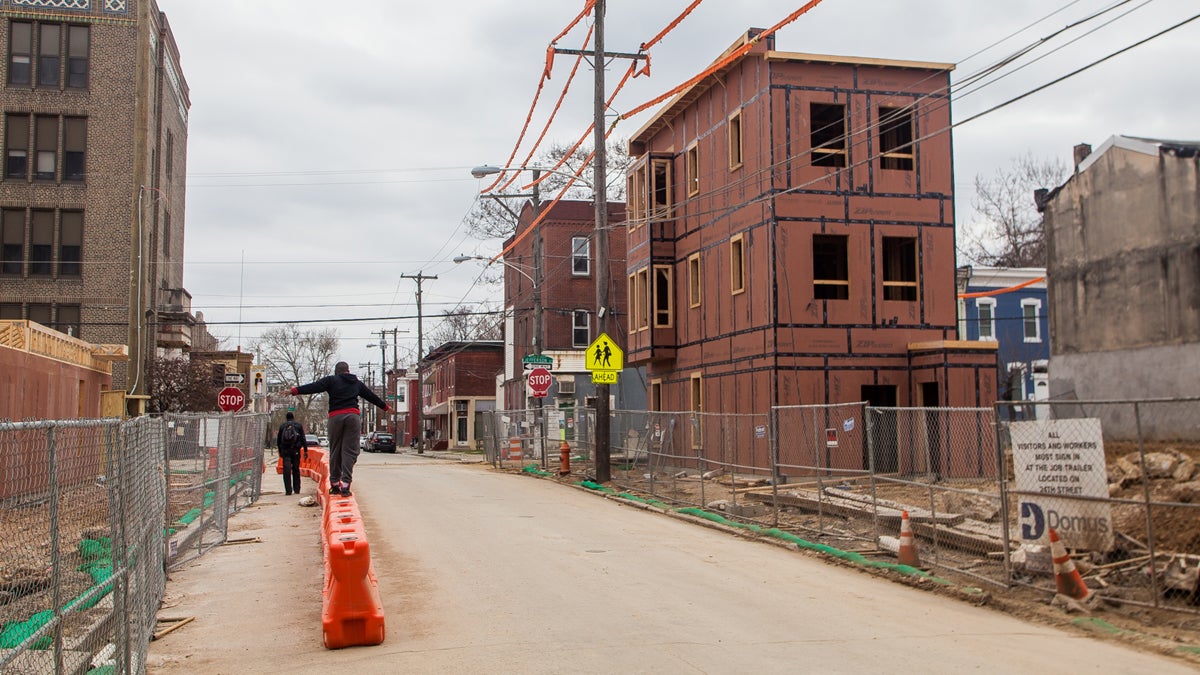In case you missed it: This week’s best reads from Pennsylvania cities

New homes being constructed around the recently imploded Sharwood homes and the old location of North Philly Peace Park. (Brad Larrison/for NewsWorks)
Housing and politics, everyone’s favorite topics of conversation.
Gimme shelter
As we’ve reported, Pennsylvania has a housing problem, or rather, a few housing problems. From rising costs in cities to aging housing stock, finding a place to call home is a challenge in the Keystone state.
A recent Department of Human Services report confirmed this, finding there was a shortage of affordable housing in Pennsylvania. The report also addressed the housing challenges associated with elderly residents in nursing homes and those with disabilities, and called for gathering better data on housing needs.
The National Low Income Housing Coalition found the Philadelphia region was the least affordable area in Pennsylvania. That might not surprise you, but the reasons are interesting: since housing prices fluctuate so much across the five-county region, “fair market rent” is difficult to capture accurately. Low-income residents in high-cost areas find their housing vouchers don’t go as far as they might elsewhere.
Speaking of housing in Philadelphia, have you checked out PlanPhilly’s coverage of the Sharswood neighborhood? The city housing authority is using eminent domain to remake the neighborhood into something shinier, and residents have mixed feelings about the changes.
Some of the push back has been at an unlikely site, a community garden occupying land owned by the Philadelphia Housing Authority. PHA CEO Kelvin Jeremiah says, “To change [the plan] because there were folks who believe they can trespass on property that they don’t own just seems a little bit foolhardy to me.”
But Tommy Joshua, the brains behind the community garden says, “You got local people trying to do something. And you gonna come and fence off their garden, like they some criminals?”
In the end, PHA reclaimed the land but offered the garden new space on which to start over.
Sharswood isn’t the first neighborhood to undergo revitalization, and the outcomes aren’t always pretty. In the Hawthorne neighborhood, the memories are still very raw for some residents.
All politics is local
In Pennsylvania’s 2000+ municipalities, politics can often be hyperlocal. When townships, villages, boroughs and cities all occupy the same space, things get crowded. But consolidating services can be a politically divisive idea.
At the Keystone Crossroads Urban Ideas Worth Stealing conference, local leaders discussed how working together can benefit everyone. But how do you convince wealthier suburbs to work with poorer areas?
Lancaster mayor Rick Gray says, “there won’t be inter-municipal cooperation until the state incentivizes it financially.”
Until that day, there are some lessons that municipalities can take from each other.
Like York, following in the footsteps of Pittsburgh, Philadelphia and Harrisburg, considering decriminalizing marijuana. Or Reading discussing municipal ID cards for residents without a drivers license or passport. Pittsburgh and Philly are considering the same.
One local fight is having national implications. Friends of Lackawanna is a Scranton-area activist group protesting the expansion of the Keystone Sanitary Landfill. They are worried about environmental concerns, but the host boroughs are worried about what will happen to their tax base if the landfill closes up shop.
Friends of Lackawanna has Senator Bob Casey on their side, and he’s even proposed national legislation that would slow the flow of garbage into Pennsylvania. It’s called, appropriately, the TRASH Act.
Except for state politics
Pennsylvania finally joined the majority of states in the nation that fund schools based on enrollment. The rule used to be that no school district would get less money than the year before, which favored districts with declining enrollment. Now, funding will be distributed based on number of students, plus factors like poverty, ESL and transportation costs.
The state also released it’s four-year strategic plan for aging. Pennsylvania has a lot of people over the age of 60, just under 3 million of them, and they have a lot of needs. The state’s plan focuses on improving access to services and programs, and empowering caretakers. Even if you don’t care about that, the click is worth it for a picture of adorable centenarians at a dance.
Shrinking and drinking
In other news, Philadelphia might not be the fifth-largest city in the country for long. Phoenix, the city’s neighbor in alphabet and size, is nudging up there and will likely slide into fifth in 2016.
If you’re looking to drown your sorrows, Philadelphia, try a gas station. Governor Wolf’s effort to ‘free the six pack’ is making slow progress as the Liquor Control Board extended beer-selling-licenses to nine gas stations. This may violate state law, which prohibits the sale of alcohol and gasoline at the same location, but that’s for the courts to decide.
Rumor has it, in Arizona you can buy wine, beer and liquor all at the same store without a court battle. I’m not saying we’ve figured out how to get Philadelphia back to fifth place. But I am saying that gas station hoagies taste a whole lot better when there’s beer in the cooler. Consider it, Pennsylvania. For the good of the ranking.
WHYY is your source for fact-based, in-depth journalism and information. As a nonprofit organization, we rely on financial support from readers like you. Please give today.

